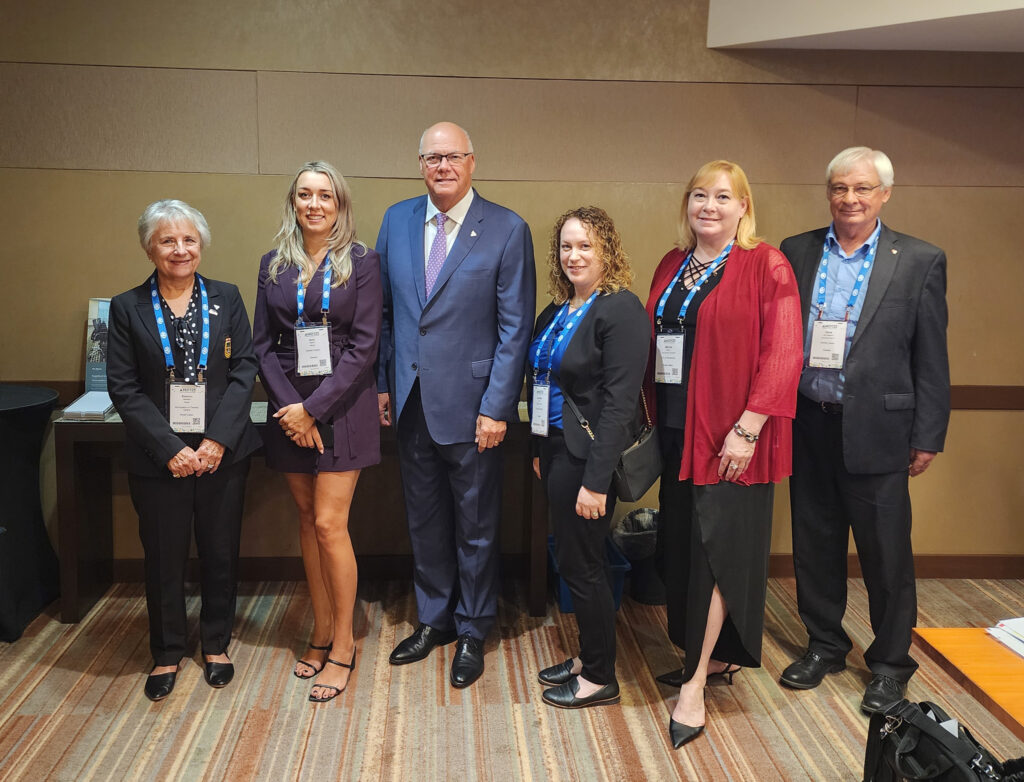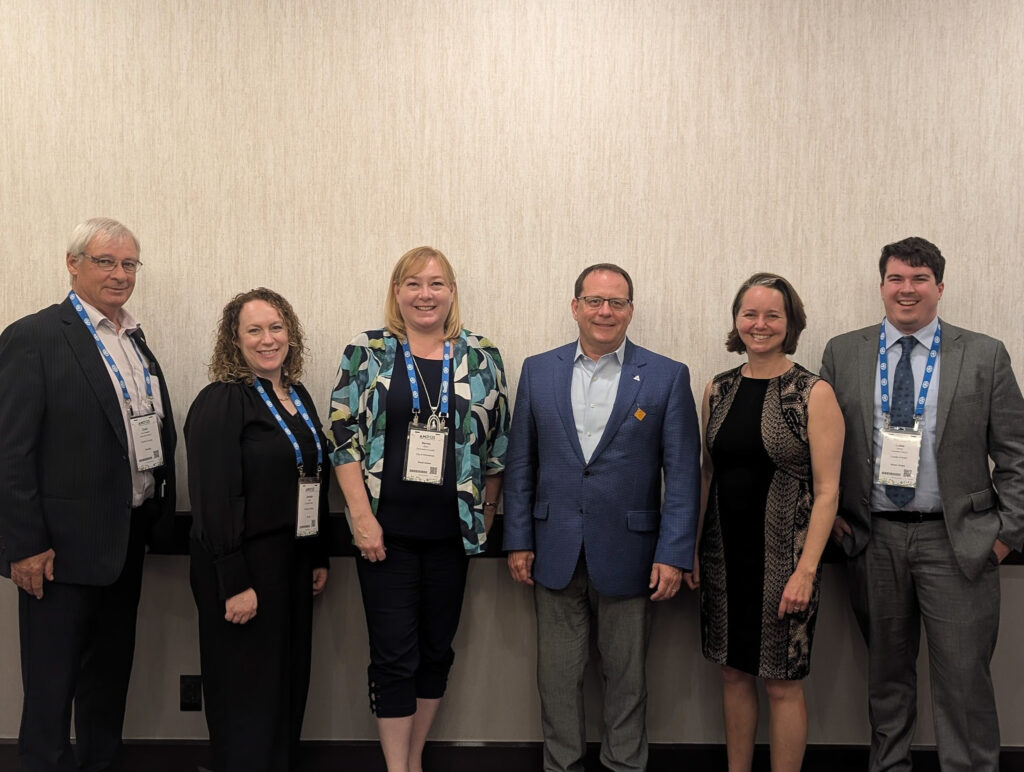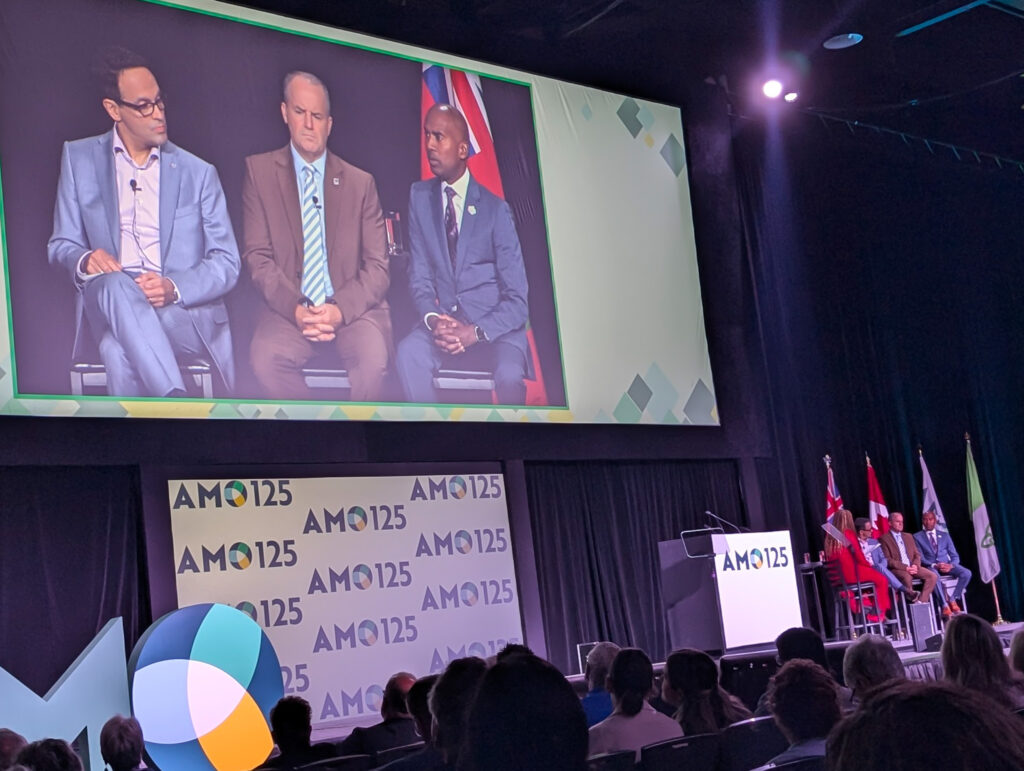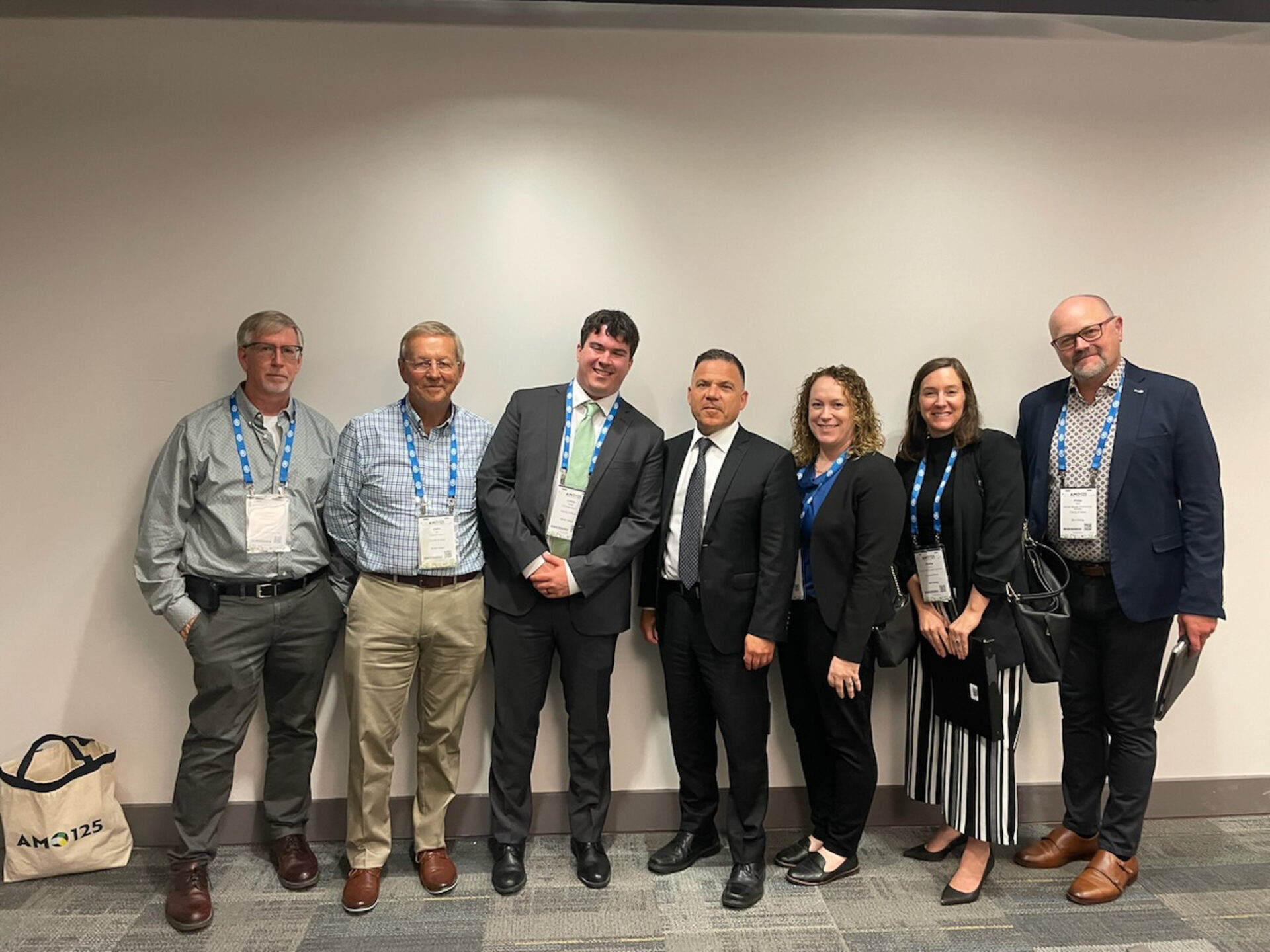With files from Lukas Oakley
County councillors, John Bell, Jennifer Kyle, John MacAlpine, and Lukas Oakley, along with staff members Phil Mete, General Manager of Community Services and Alysha Dyjach, General Manager of Development Services, attended the Association of Municipalities of Ontario’s (AMO) 125th annual conference in Ottawa from Sunday, August 18 to Wednesday, August 21, 2024.
Delegates from Ontario’s 444 municipalities attended the conference to advocate for both local and shared issues to Ministers of the Ford government. During the event, the delegates attended information sessions, elected a new AMO Board of directors and collaborated with municipal peers.
On behalf of the County, delegates met with Rob Flack, Minister of Agriculture, Food and Agri-Business; and Anthony Leardi, MPP for Essex and Parliamentary Assistant to Sylvia Jones, Minister of Health.

During their delegations with Minister Flack, the County advocated for the April 2024 proposed Provincial Planning Statement to clearly define Agricultural Impact Assessments.
The Agricultural Impact Assessments are used to assess whether farmland that is proposed to be converted into non-agricultural use, is suitable for conversion or regarded as prime agricultural land (as required by the Provincial Planning Statement).
“Having a clearly defined Agricultural Impact Assessment study would enable the County to have teeth when it comes to protecting farmland from requests for urban boundary expansions and non-agricultural usage applications in our prime agricultural lands,” said Lukas Oakley, Ward Two Councillor for the County of Brant. “The County also requested that municipalities be consulted on defining the criteria for an Agricultural Impact Assessment study.”

Oakley noted that Paul Calandra, Minister of Municipal Affairs and Housing, released the province’s finalized Provincial Planning Statement on Tuesday, August 20, but that from what he could see, there were still no specifics on the Agricultural Impact Assessment.
“Our Planning department will be providing a fulsome update on the context and implications of the document later this year,” said Oakley. “Minister Flack did inform us during our delegation that they intend to consult municipalities in the coming months on the Agricultural Impact Assessment specifically, and we will be eagerly awaiting the opening of that consultation period.”

With MPP Leardi, the County of Brant requested that the Ministry of Health support the Brant Community Healthcare System (BCHS) in moving to the next stage of planning for the Brantford General Hospital and the Willett Urgent Care Centre.
“Specifically, the County requested the BCHS immediately receive the remaining $8.5 million needed to finish the next planning stage, and that the development of the new hospital be included in Ontario’s 2025 budget,” said Oakley. “Following the County delegation with Parliamentary Assistant Leardi, the City of Brantford held a delegation with Minister Jones, to continue the conversation and reinforce the need our community has for a new hospital. Working in lock-step on messaging with the City and the Brant Community Healthcare System, we are optimistic following both delegations that the Ministry of Health is well aware of the importance of this matter.”
Later, the County delegates attended a number of delegations with the South Central Ontario Region Economic Development Corporation (SCOR EDC), A regional partnership comprising the Counties of Brant, Elgin, Middlesex, Norfolk and Oxford.
The County reps of SCOR attended delegations with the Ministry of Agriculture, Food and Agri-Business; the Ministry of Labour, Immigration, Training and Skills; the Ministry of Energy; the Ministry of Rural Affairs; the Ministry of Economic Development, Job Creation and Trade, the Official, Opposition Ontario NDP; and the Ontario Green Party.

While SCOR applied for time with the Ontario Liberal party, the delegation was not granted, though representatives did attend a reception hosted by the Liberals.
During their time with SCOR, the County of Brant advocated several topics including:
- Southwest Community Transit (SCT), a transit network which connects nine municipalities and covers 21,000 km², of which Brant Transit is a partner.
“We advocated to have this vital funding continue past the planned closure date of March 2025 as the transit has become critical for members of our shared community including workers using the service to get to work, students needing transportation to school, and seniors accessing healthcare to remain in their homes independently,” said Oakley. “An end to SCT could have an impact on lost wages across the region to the tune of nearly half a billion dollars, assuming the workers using the transit services receive average hourly wages of $20 per hour.”
- Agricultural Impact Assessments and broader land use strategy in rural Ontario.
“As SCOR is the home to one third of Ontario’s Rural population in the heart of prime farmland. All member municipalities including the County of Brant have been tasked with the important work of building homes, but have not been given clear direction on how to assess which lands must be developed,” said Oakley. - The region’s expanding energy needs, specifically, renewable energy.
“From a Brant specific lens, we requested government funding or programs to support our Brant Municipal Enterprises in its solar energy programs, as well as exploring interest in reviving the low-rise hydroelectric dam the County had a contract signed for in 2018 before it was canceled by the current government,” added Oakley. - Rural Ontario’s infrastructure needs and struggles.
“We advocated for the government to carefully consider rural Ontario’s unique infrastructure needs and struggles, highlighting that our pockets of urban areas are more expensive to service than cities,” noted Oakley. “In particular, we emphasized the importance of giving us tools to encourage concentrated growth, rather than dispersing that growth, as it vastly increases the cost of delivering infrastructure for the same number of homes (plus the impact of disrupting and destroying agricultural lands).”
The County also had a chance to attend a number of information concurrent sessions on a variety of topics.

From long-term financial plans to the future of energy in Ontario, how to meaningfully improve civic engagement of Ontario’s youth, the rise of political extremism, how to meaningfully impact homelessness on the local level, and innovation in the affordable housing sector, there were plenty of opportunities for discussions.
Steve Paikin, a Canadian journalist and author, hosted two different panels about housing and infrastructure.
“The main takeaway from both panels was that the financial relationship between Ontario municipalities and the province has not changed in the 125 years that AMO has operated,” said Oakley. “The costs and responsibilities that Ontario municipalities are expected to bear have increased exponentially in that time, and with the now $260 billion of infrastructure investment looming for the 444 municipalities in Ontario, a conversation to change that must happen.”
In addition, several plenary sessions were held for several ministerial announcements, keynote speakers, addresses from all four major party leaders and the ministers’ panel frequently known as the “bear pit.”

Plenary Sessions
Doug Ford, Premier of Ontario.
“Premier Doug Ford emphasized their focus on Ontario’s economic growth, boasting that their government has not had to raise taxes in their six years as government,” said Oakley. “Many conference goers would highlight, online and in-person, how this was accomplished by downloading those costs onto municipalities to take the fall for the necessary tax increases. Ford highlighted their efforts to encourage companies to come to Ontario, and the Building Faster Fund, investing in water and wastewater systems through grants.”
Marit Stiles, Ontario NDP leader.
“[She started] her address by talking about the need to ensure women feel welcome in office and the need for politics to be a civil and respectful environment,” added Oakley. “She then called for a “new deal” for municipalities, following the advocacy of AMO for a Social and Economic Prosperity Review (a sentiment that was later mirrored by both Bonnie Crombie and Mike Schreiner in their speeches), and that she would dedicate a Ministry to Homelessness and Opioid Addiction. Stiles then announced their plan to fund 50 per cent of municipal transit services, increase ambulance funding, change the public healthcare funding model, and increase infrastructure funding. She highlighted the Ontario NDP was the only party to have announced creating a public builder (Homes Ontario, suggested to be a similar model to BC’s BC Build).”
Bonnie Crombie, Ontario Liberal Party leader.
“[She] spoke immediately afterwards, critiquing the Ford government’s priorities and describing her party’s interest in prioritizing community needs, healthcare, education, the economy and affordability,” said Oakley. “Crombie then spoke about her party’s vision for a ‘new deal,’ assisting municipalities with housing, the opioid crisis, infrastructure, and community hospitals. Crombie focused on ensuring collaboration with municipalities.”
Mike Schreiner, Ontario Green Party leader.
“He started his address on ensuring municipal elected officials serve in a respectful environment, and that he would ‘fix the broken fiscal framework,’” said Oakley. “Schreiner then announced the Ontario Green’s intent to also create a Ministry dedicated to helping the homeless. He described Ontario as having a ‘crisis of caring’ and that we need a provincial government that cares about the people it serves. He also spoke of a “new deal”, focusing on climate-ready infrastructure, and building a fair and caring society.

Plenary Session – “The Bear Pit,” formerly known as the Minister’s Forum
Known as a tradition at the both the AMO and Rural Ontario Municipal Association (ROMA) conferences, a question and answer panel is held where elected official delegates are able to ask current ministers in the provincial government, impromptu questions.
During the “Bear Pit,” Marianne Meed Ward, Mayor for the City of Burlington, asked the panel of ministers when Ontario municipalities could expect the funding model to change.
“[She highlighted] that the funding model is unchanged since the founding of Canada as an independent nation, and that municipalities are not equipped to handle issues like the mental health and addictions crisis,” said Oakley. “The Minister of Finance, Peter Bethlenfalvy, did not commit to changing the funding model.”
Additionally, Pickering Councillor, Mara Nagy, asked Minister Calandra when Ontario municipalities can expect the government to release and pass their bill to address the harassment of municipal councillors and employees by their peers.
“[She detailed] her experience after a fellow councillor on her council had encouraged harassment and death threats to be sent to Councillor Nagy,” noted Oakley. “Minister Calandra insisted he still needed more time to “get it right” and that he has asked the Ontario integrity commissioner to come with recommendations that will withstand a charter challenge the first time a municipal official is removed from office for abusive behavior.”
Overall, Councillor Oakley said that the County of Brant found the AMO 2024 Conference to be a success and that the County’s Government Committee will be debriefing what they learned to inform future advocacy and County policy objectives.
Kimberly De Jong’s reporting is funded by the Canadian government through its Local Journalism Initiative.The funding allows her to report rural and agricultural stories from Blandford-Blenheim and Brant County. Reach her at kimberly.dejong@brantbeacon.ca.
